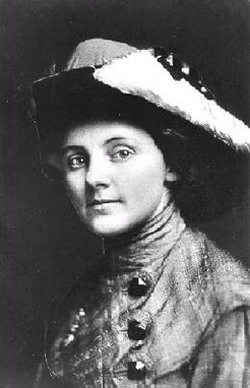

Queer Places:
Babaoshan Cemetery
Beijing, Beijing Municipality, China
 Anna
Louise Strong (November 24, 1885 – March 29, 1970) was an author, writer.
Anna
Louise Strong (November 24, 1885 – March 29, 1970) was an author, writer.
Anna Louise Strong was born to middle class liberals active in church and missionary work. She studied at Bryn Mawr and Oberlin Colleges, then she received a PhD in philosophy from the University of Chicago. She worked for the United States Education Office, and joined the National Child Labor Committee.
Her early life led her to believe that capitalism was responsible for the sufferings of the working class. She lived in Seattle from 1916 to 1921 because the political climate was pro-labor and progressive. In 1916, she served on the Seattle School Board. That same year, e New York Evening Post hired her as a stringer to report on the conflict in Seattle between armed guards of Everett mill owners and the Industrial Workers of the World, which led to the Everett massacre.
She became a spokesperson for workers' rights. When the United States entered World War I in April 1917, she spoke out against the draft. Some groups joined her in opposing military training in the schools, but military veterans of the Spanish–American War branded her as unpatriotic. School board members launched a recall campaign against her due to her association with the IWW, and replaced her with a prominent country club woman. She left the country to find a more socialist environment, going to the Soviet Union where she stayed from 1921 to 1940 for part of each year, returning to the U.S. for a lecture tours.
She became associated with a labor-owned newspaper, writing pro-labor articles and promoting the Soviet government. She wrote in support of the Seattle General Strike of 1919, which shut down the city for four days and then ended peacefully but with its goals unmet. She traveled to Poland and Russia serving as a correspondent for the American Friends Service Committee, to provide the first foreign relief to famine victims. She was named Moscow correspondent for the International News Service, and wrote “The First Time in History” and “Children of Revolution”. She grew to become a supporter of socialism in the Soviet Union, and in 1925 she returned to the United States to raise interest in industrial investment and development in the Soviet Union.
In the late 1920s, she travelled in China and other parts of Asia. She became friends with Chinese leaders, and wrote several books, including “China's Millions”, and “Red Star in Samarkand”. In 1930 she returned to Moscow and helped found Moscow News, the first English-language newspaper in the city, as managing editor and a featured writer. She became more enthused with the Soviet government and wrote many books praising it, and also wrote several articles for The American Mercury praising Soviet life. In 1936 she returned to the United States, and wrote numerous articles and books about the USSR.
Her Chinese Communist sympathies may have led to her arrest and expulsion from the USSR in 1949. After this, she was cut off from the USSR, shunned by Communists in the United States, and denied a passport by the U.S. government. In 1955, she was cleared of Soviet charges against her, and shortly after her passport was restored. She settled in China, and published “A Letter from China." She tried to change the stance of the U.S. government in backing the Chinese nationalists.
Strong died in a hospital in Beijing, after refusing medical treatment, despite visits from Chinese government officials. After her death, there was mourning throughout China.
My published books: